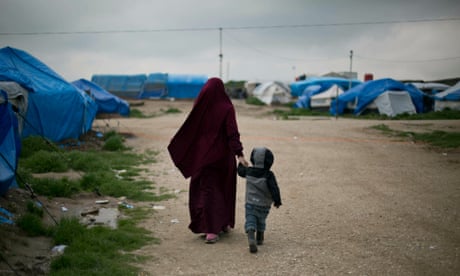- by foxnews
- 10 Mar 2025
‘Indefinite torture’: the desperate wait for Australian mothers in Syria to get their children out
‘Indefinite torture’: the desperate wait for Australian mothers in Syria to get their children out
- by theguardian
- 30 Apr 2023
- in news

Australian mothers trapped with their young families inside one of Syria's brutal detention camps say they are desperate to get their children out, fearful they will be taken from them, or they will die.
"The kids are shaken each time they see a soldier holding a gun," one mother in the camp said. "And each night, when the boys hear a car, they can't sleep, afraid they will be taken away from their mother."
About 40 Australians - 10 women and 30 children - remain held within the Roj camp in north-east Syria, near the Iraqi border.
They are the wives, widows and children of slain or jailed Islamic State fighters: most have been held in the squalid detention camp more than three years. Conditions are "dire", the Red Cross says, and the security situation "extremely volatile".
Communications inside the camp are heavily restricted. But the Guardian has spoken with mothers inside the camp, as well as with families in Australia, and independent sources with access inside, and knowledge of the camp's operations.
"Since the earthquake struck in early February it affected the stability of the camp which already was very unstable," one source said.
"Whenever any event happens in either Iraq, Syria or Turkey it affects us drastically, if one road is blocked we have no more access to clean drinking water, if another is blocked we have no fruit. Disease is widespread, water is scarce."
One Australian teenager, Yusuf Zahab, died last year after being separated from his family. He was 11 when he was trafficked into Syria.
Other Australian boys were told earlier this year they faced potential removal.
The health of the Australian children has deteriorated dangerously over winter. Within the Australian cohort there is a three-year-old girl who suffers from a severe, but undiagnosed chest condition.
During winter, in tents in sub-zero temperatures, her face and hands would turn blue because of a lack of oxygen. Her family's request for supplementary medical oxygen treatment to help her breathe were rejected.
"Another 11-year-old suffers severely from asthma and, because of the nearby oilfield and sub-zero temperatures, he almost lost his life. It's a miracle that he is still with us today."
Other children are exhibiting worsening psychological manifestations - including severe anxiety, bed-wetting, insomnia, and panic attacks.
"We have children with shrapnel wounds, children with severe untreated infections because the doctors can't find the cause, a child with an untreated broken nose who now has difficulty breathing.
"The environment is toxic for them, mentally and physically."
Troops conduct raids in the middle of the night, seeking boys for removal, or potential Islamic State operatives. "A little three-year-old woke up asking if they were going to shoot," one woman said.
There have been repatriations of other foreign nationals every week this year, one source told the Guardian. But the Australians left in the camp say the uncertainty of if, and when, they will leave, has been damaging.
"The feeling of uncertainty and being left in the dark is deadly, especially when you are so desperate to get out."
The children are being damaged by every day they are forced to spend in the camps, one mother told the Guardian: "Each day here is a day lost in their lives."
"Our children are very reserved, don't have social skills, have never been to a real school, don't know what it feels like to go to sleep at night and feel safe, that no one is coming to take them away or barge into the tent and scream at us for a random search and abuse their mothers in front of them."
The women have reiterated their commitments to comply with any restrictions - including formal control orders - imposed by the Australian government upon their return to Australia.
Australia has undertaken two repatriation missions from the camps in north-east Syria. In 2019, eight orphaned children, including a pregnant teenager, were returned to New South Wales from the camps.
And last October, four women and 13 children were brought back, also to NSW. The Albanese government has said it is committed to repatriating all of the Australians it can safely evacuate, but has not given any indication when another mission will be launched. A spokesperson for the home affairs minister declined to comment this week.
Of the women returned to Australia last year, one, Mariam Raad, has been charged with entering, or remaining in, a "declared area" in 2014 - Syria's al-Raqqa province, which was then under the control of Islamic State - in breach of federal law. Her case is currently before a NSW court.
All members of the Australian cohort inside Roj camp - 12 families - have had their identities confirmed by the Australian government. They are Australian citizens and legally entitled to re-enter the country.
Some of the children were born in Roj camp, and know no life outside it. Many of the women say they were coerced, tricked or forced into travelling to Syria by husbands who have since died.
"We hope that a move is made soon for the sake of the children left here in these deteriorating conditions," one mother said. "Especially the boys and their mothers who hold on every night for the sun to come out so that they won't be taken away."
- by foxnews
- descember 09, 2016
Ancient structure used for cult 'rituals' discovered by archaeologists
A Neolithic Timber Circle was discovered by archeologists in Denmark resembling the historical landmark Stonehenge in the U.K. It is open to be viewed by the public.
read more


